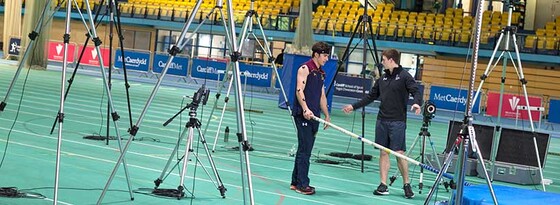|
Both sports science & sports medicine studies lead to a very broad spectrum of careers & specialties. If you have something that you want to achieve in career settings, it will be easier to choose which to study from & take yourself further. For those asking this question which is better, this article will help firm up which is the one you are looking for & why you should be studying either sports science or sports medicine. In this article, we uncover some of the more commonly asked questions on sports science studies which include:
What Is Sports Science Sports science is about finding out how athletes can improve their performances in a particular sport using statistical analysis of different types of training programs, biomechanics of human movement, biomechanics of sports specific, & finding out the advantages & disadvantages of various training methods, a bit technical, but it does reveal why some brains in sports science is a requirement to help improve your competitive training, you are dealing with athletes or high level of athleticism & of competition, you are a high-performance coach. From anyone's perspective that is constantly looking for a competitive edge physically to enhance performance & function for sport-specific, be it bodybuilding or dragon boating, Olympic weightlifting & so on, having a strong understanding of how the body reacts to the environment is important. This is because oftentimes, an individual may be trying out a training routine with a few friends but not getting the same results even after tweaking many variables in the exercise routine than others. This is one of the many factors when a high-performance coach comes into action. Their expertise lies in the knowledge & abilities to analyse what is it that needs to change in the routine, & how to tackle it for progress. The main goals of sports science practitioners are:
Broad clientele Fortunately, there are many aspects to applying sports & exercise science, which would be equipping you with enough knowledge to work with both young & old clients, & the area of study allows you efficiently progress or regress a movement, exercise routine, or tweak the periodisation of the length of the goal. This field of study can have you see a very broad spectrum of clients from high powering athletes to those looking to gain more functional movements in their daily activities. However, when it comes to pain & fixing a client, they may have limited knowledge on how the body responses to certain types of stimulation that would enhance function & decrease inflammation, which could greatly reduce a person's performance if done incorrectly. There is a saying "don't fix a medical condition with a fitness program", & it is true to know that while a fitness routine is essential to having a stronger, healthier you, it can be detrimental to their current state of wellbeing due to reduced ability to recover, & doing things that is painful is never the way to enhance anything, especially in term of increasing one's performance/function (s). "When training is pursued with the same zeal following an injury, clients can easily fall into chronic injuries, consequently losing the ability to move without pain" Psychology in SportsAn in-depth study of human psychology / behavioral science is another bonus that students cover which would help in shaping & curating their program/ activity as different age groups & set of people will act differently to certain implementation of movements, rest time, & so on. Most of the high-performance coaches are known to work at both private & commercial gym settings for fitness training, clinics that serve as rehabilitative care for sports, chiropractic clinics, national athletic teams, scientific research for public & private sector. The benefit of working as a high-performance coach is that you are able to work with a broad clientele helping people solve their endeavors of accomplishing higher levels of efficiency through smart programming & coaching. The takeaway from sports science, if you want to work with clients to help improve fitness, increase sport-specific performance, be involved in independent research, then this is your path. What is Sports Medicine? Sports medicine, on the other hand, is a developing area of healthcare, focused on the prescription of exercise & movement, which includes other medical professionals doctors from different disciplines. It's also a specialty that is having additional training to become a sports medicine specialist. Another point to note that of which separates sports science & medicine is that specialists will be exposed to a wide variety of clinical information that covers orthopaedic testing, health assessments, drugs, & even manual therapy such as tissue manipulations & other modalities to use for intervention treatment of an individual. Those who are in the high-performance category will face frequent injuries, which need to be treated or managed to regain close to optimal function & back to sports activities. This is because the involvement of sports requires several variables to be met, the use of medical specialists to help the individuals is an integral part of the overall equation (restoring function). Not only are they capable of addressing the physiological issues that contribute to movement/pain/performance, but also to prevent or reduce the risk of injury. The main reason why sports medicine specialists are in high demand in both rehabilitation centres & sporting teams. The main goals of sports medicine are:
Specific Clientele Injuries are extremely common & can occur at any time, anywhere, whether from a skateboard collision, a fall, or a simple car wreck, the knowledge of taking someone through a rehabilitation program is essential to have regained pain-free movement & optimal function for sports or daily activities. Specialists in this area will mostly see pain-related cases that need either a preventative, pre-post operative care, management, & treatment of both acute & chronic problems. This field of study can have you see a very broad spectrum of clients as well, but mainly to help them recover from injuries, teach patients long term management to avoid or prevent the same injuries. As it is sports medicine specialists will not be well equipped with enough biomechanics knowledge to help with sports-specific & high-performance programming such as periodisation for competitive (that's the sports science expertise), they would have to refer back to someone who can help with just that. The benefit of working as a sports medicine therapist/ trainer is that you are working with people to help them regain pain-free movement & back to sports, along with the ability to communicate clearly with other healthcare professionals, you are also able to As you can see both of which discipline are very similar however different in the scope of practise & expertise. They compliment each other, & working together guarantees a higher clinical outcome for the patient & better performance for the client. In the pursue of which is a better education pathway Sports Science Vs Sports Medicine, hopefully you find the answer by now.
Check out the Sports Medicine Certificate studies for entry-level studies in this discipline. |
Archives
March 2024
Categories
All
|
Services |
Company |
|
|
Integrated Training Institute
|



 RSS Feed
RSS Feed